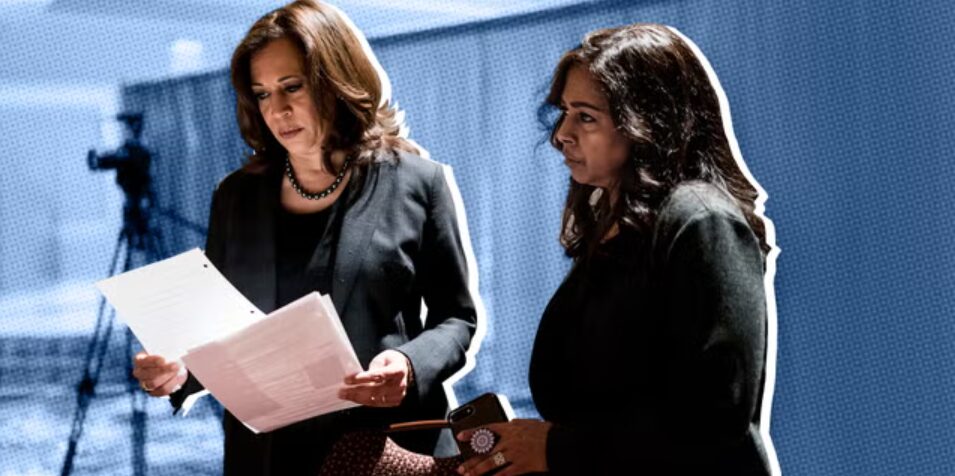On Sunday, a significant shift occurred in Democratic politics, marking a pivotal moment as Kamala Harris is poised to become the party’s leading figure at the Chicago convention in less than a month, barring any unforeseen events. This development signifies more than a mere change in leadership; it represents a swift and largely unseen transfer of power among campaign operatives, donors, and advisors within Washington D.C.
Harris’s approach to distinguishing herself from Joe Biden remains uncertain. It is anticipated that she will advocate for many of the same policies and achievements of Biden’s administration, supported by the same party mechanisms and allies. However, the key differences will likely emerge in her choice of advisors, as the adage goes, “personnel is policy.”
During her unsuccessful 2019 presidential campaign, Harris’s sister, Maya Harris, chaired her campaign. Maya’s husband, Tony West, an influential figure in Silicon Valley and a major fundraiser for Democratic politicians, played a significant role. West’s position as Uber’s chief legal officer belied his substantial influence, especially in orchestrating the company’s political victories against organized labor.
Currently, Harris is in discussions with Bearstar Strategies, a consultancy firm with a dominant presence in California politics. Bearstar is known for its strategic use of opposition research and its adept handling of cultural issues to promote centrist, business-friendly candidates. The firm played a crucial role in Harris’s rise from California’s attorney general to the Senate and her previous presidential campaign. Bearstar’s strategists have also been instrumental in electing prominent Democrats in California while advising major corporations on political strategies. Laphonza Butler, a former California senator, also worked for Bearstar, advising Uber on its campaign to avoid classifying drivers as employees.
Despite Harris’s progressive rhetoric during her 2019 primary campaign, where she supported Medicare for All and the Green New Deal, her inner circle reveals a more moderate stance. Many of her former aides, including Yasmin Nelson, Meaghan Lynch, Andy Vargas, Michael Collins, Michael Fuchs, and Deanne Millison, have transitioned to roles in corporate lobbying. This trend underscores Harris’s inclination towards centrist policies, despite her progressive campaign promises.
Harris’s initial recruitment efforts for her current campaign further emphasize this trend. Reports indicate she is seeking to enlist Obama administration veterans Karen Dunn and David Plouffe. Plouffe, who previously advised Uber, and Dunn, Google’s lead lawyer in its antitrust lawsuit, suggest a pro-business orientation. Eric Holder, former Attorney General under Obama and now a corporate advisor, is also part of Harris’s team, tasked with vetting potential running mates.
This approach mirrors the political style prevalent in California. Governor Gavin Newsom, who worked with Harris in San Francisco, has similarly blended progressive rhetoric with centrist governance. Newsom’s 2019 gubernatorial campaign promised single-payer healthcare and extensive housing projects, yet these initiatives were sidelined once he assumed office. Harris’s first bid for attorney general followed a similar pattern, where she pledged to crack down on corporate criminals but ultimately prosecuted sparingly, avoiding major cases against large businesses.
Political campaigns often feature grand promises, but the true intentions of a leader can be discerned from their personnel choices. For instance, Obama’s appointments of veteran investment bankers signaled a lenient approach towards Wall Street post-2008 financial crisis. Trump’s appointment of Robert Lighthizer indicated a shift in trade policy. Biden’s selection of Lina Khan to chair the Federal Trade Commission has led to a renewed focus on corporate regulation, while his team of Russia hawks has influenced U.S. foreign policy.
In the American presidential system, the focus on the presidency as an individual role can be misleading. The President oversees a vast team of approximately 4,000 appointees who manage federal operations. Each administration’s power lies in its ability to replace these key figures.
Biden’s cabinet reflects a mix of progressive and conservative Democrats, showcasing his balanced leadership style. Harris, however, remains an unknown quantity. Her deep connections to Silicon Valley and the business wing of the Democratic Party hint at a pragmatic and centrist approach, defining the potential vision for Harris 2024.
